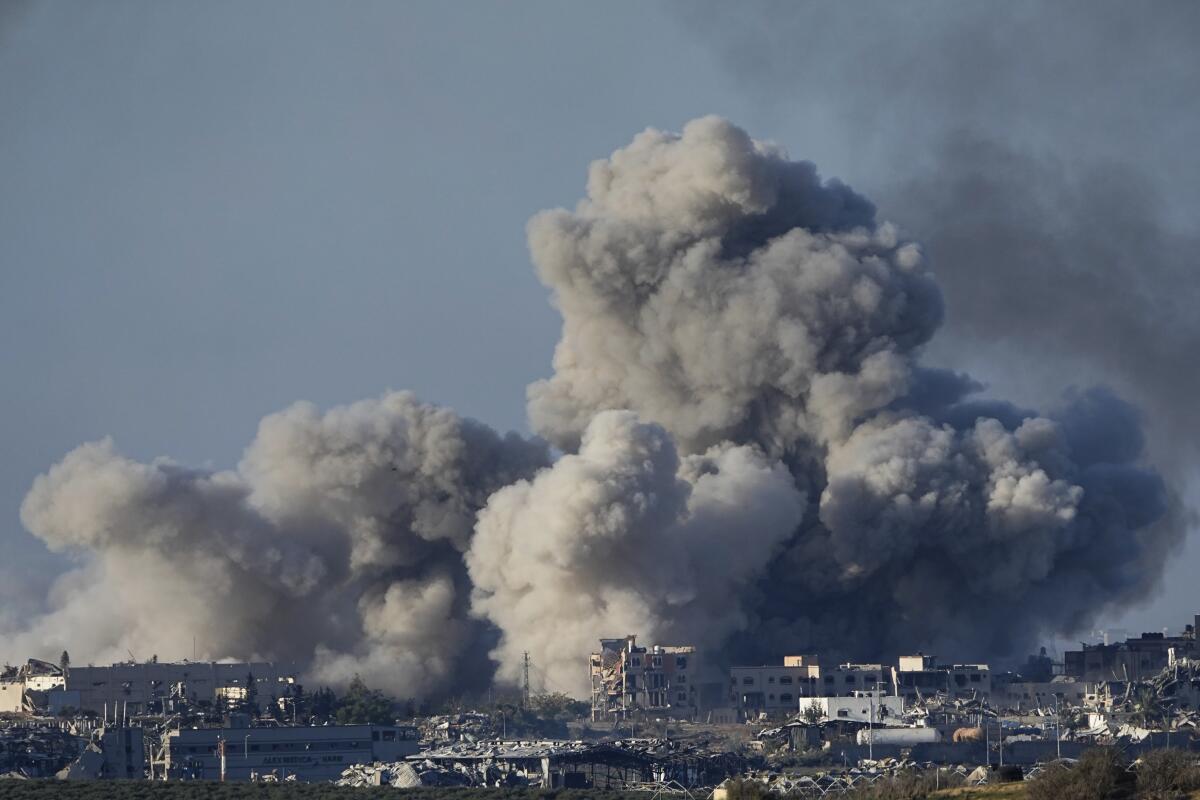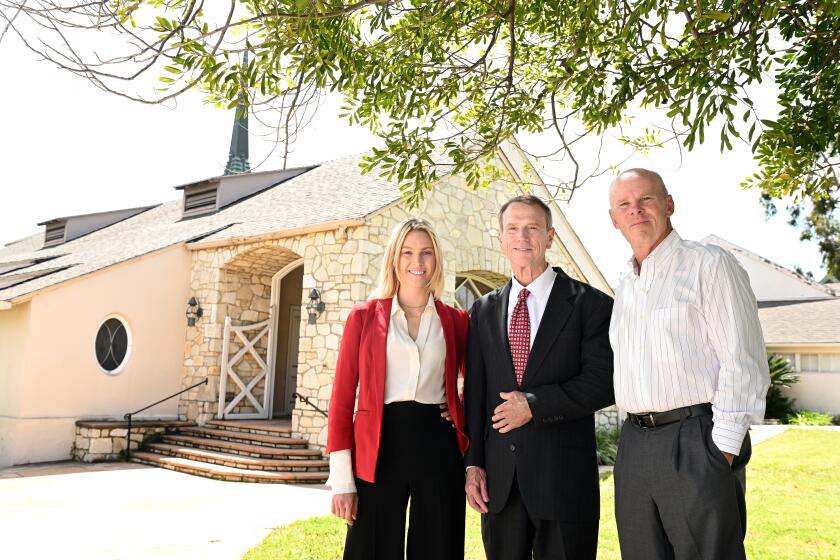3 hostages mistakenly killed by troops had been holding a white flag, Israeli military official says

- Share via
JERUSALEM — Three Israeli hostages who were mistakenly shot by Israeli troops in the Gaza Strip had been waving a white flag and were shirtless when they were killed, an Israeli military official said Saturday.
Prime Minister Benjamin Netanyahu said in a nationwide address that the killings “broke my heart, broke the entire nation’s heart,” but he indicated no change in Israel’s intensive military campaign. “We are as committed as ever to continue until the end, until we dismantle Hamas, until we return all our hostages,” he said.
Anger over the mistaken killings is likely to increase pressure on the Israeli government to renew Qatar-mediated negotiations with Hamas over swapping more of the remaining captives, which Israel says number 129, for Palestinians imprisoned in Israel.
A senior Hamas official, Osama Hamdan, reiterated that there will be no further hostage releases until the war ends and Israel accepts the militant group’s conditions for an exchange. Netanyahu said Israel would never agree to such demands.
Israel’s account of how the hostages were killed also raised questions about its soldiers’ conduct. Palestinians on several occasions have reported that Israeli soldiers opened fire as civilians tried to flee to safety.
An Israeli military official, who spoke on condition of anonymity to brief reporters in line with military regulations, said it was likely that the hostages had been abandoned by their militant captors or had escaped. The soldiers’ behavior was “against our rules of engagement,” the official said, and was being investigated at the highest level.
Gov. Gavin Newsom and Atty. Gen. Rob Bonta want to join a developer in suing the affluent city for denying a “builder’s remedy” housing development that should have sailed to approval.
The hostages did everything they could to signal they weren’t a threat, “but this shooting was done during fighting and under pressure,” Herzi Halevi, chief of the military’s general staff, said in a statement later Saturday.
Halevi added: “There may be additional incidents in which hostages will escape or will be abandoned during the fighting. We have the obligation and the responsibility to get them out alive.”
The three hostages, all in their 20s, were killed Friday in the Gaza City area of Shujaiya, where troops are engaged in fierce fighting with Hamas militants. They had been among more than 240 people taken hostage during an unprecedented raid into Israel on Oct. 7 in which Hamas militants killed about 1,200 people, mostly civilians. The attack sparked the war.
Hundreds of protesters blocked Tel Aviv’s main highway late Friday in a spontaneous demonstration calling for the return of the remaining hostages. Their plight has dominated public discourse in Israel since the Oct. 7 attack. Their families have led a powerful public campaign calling on the government to do more to bring them home.
Speaking at a Saturday night rally in Tel Aviv, Rubi Chen, father of 19-year-old hostage Itay Chen, criticized the government for believing hostages could be retrieved through military pressure on Hamas. “Put the best offer on the table to get the hostages home alive,” he said. “We don’t want them back in bags.”
The military official said the three hostages had emerged from a building close to Israeli soldiers’ positions. They waved a white flag and were shirtless, possibly in an effort to signal they posed no threat.
Two were killed immediately, and the third ran back into the building screaming for help in Hebrew. The commander issued an order to cease fire, but another burst of gunfire killed the third man, the official said.
Israeli media gave a more detailed account. The mass circulation daily Yediot Ahronot said Saturday that according to an investigation into the incident, soldiers followed the third man and shouted at him to come out, and at least one soldier shot him when he emerged from a staircase.
The Israeli newspaper Haaretz gave a similar account based on a preliminary investigation, saying the soldiers who followed the third hostage into the building believed he was a Hamas member trying to trick them.
Local media also reported that soldiers had seen a nearby building marked with “SOS” and “Help! Three hostages” two days earlier but feared it might be a trap.
Dahlia Scheindlin, a political analyst, said it is unlikely that the killings will massively alter public support for the war. Most Israelis still have a strong sense of why it is being fought and believe Hamas needs to be defeated, she said.
“They feel like there’s no other choice,” she said.
The killings emphasized the dangers faced by hostages held in areas of house-to-house combat like Shujaiya, where nine soldiers were killed this week on one of the deadliest days for ground forces in the war. The military has said Hamas has booby-trapped buildings and ambushed troops after emerging from a tunnel network it built under Gaza City.
On Saturday, the Hostages and Missing Persons Families Forum asserted that another hostage, 27-year-old Inbar Hayman, had been killed in Gaza. The group gave no details.
Hamas released more than 100 hostages for Palestinian prisoners during a brief cease-fire in November. Nearly all those freed on both sides were women and minors. Talks on further swaps broke down, with Hamas seeking the release of more veteran prisoners for female soldiers it is holding.
Israeli political and military leaders often say freeing all the hostages is their top aim in the war alongside destroying Hamas. However, they argue that their release can be achieved only through military pressure on Hamas, a claim that has sharply divided Israeli public opinion.
After negotiations broke down, Hamas said it will free the remaining hostages only if Israel ends the war and releases all Palestinian prisoners. As of late November, Israel held nearly 7,000 Palestinians accused or convicted of security offenses, including hundreds rounded up since the start of the war.
More than 18,700 Palestinians have been killed in the Israeli offensive, the Health Ministry in Hamas-run Gaza said Thursday before a communications blackout that has hampered telephone and internet services in the Gaza Strip. Thousands more are missing and feared dead beneath the rubble.
The ministry does not differentiate between civilian and combatant deaths. Its latest count did not specify how many were women and minors, but they have consistently made up about two-thirds of the dead in previous tallies.
It was the ministry’s last update before a communications blackout that continued to hamper telephone and internet services in the Gaza Strip. “Now 48 hours and counting. The incident is likely to limit reporting and visibility to events on the ground,” said Alp Toker, director of NetBlocks, a group tracking internet outages.
The war has been deadly for journalists. Dozens of mourners held funeral prayers Saturday for Samer Abu Daqqa, a Palestinian journalist working for the Al Jazeera network who was killed Friday in an Israeli strike in the southern city of Khan Yunis. According to the Committee to Protect Journalists, the cameraman was the 64th journalist to be killed since the conflict erupted: 57 Palestinians, four Israelis and three Lebanese.
The war has flattened much of northern Gaza and driven 85% of the territory’s population of 2.3 million from their homes. Displaced people have squeezed into shelters mainly in the south in a spiraling humanitarian crisis. Only a trickle of aid has been able to enter Gaza and distribution is disrupted by fighting.
Residents in northern Gaza, meanwhile, reported heavy bombing and the sounds of gun battles overnight and into Saturday in devastated Gaza City and the nearby urban refugee camp of Jabaliya.
“It was a violent bombardment,” Assad Abu Taha said by phone from the Shujaiya neighborhood. Another resident, Hamza Abu Seada, reported heavy airstrikes in Jabaliya, with nonstop sounds of explosions and gunfire.
The Latin Patriarchate of Jerusalem said two Christian women at a church compound in Gaza City were killed Saturday by Israeli sniper fire and seven others were wounded. The women were identified as a mother and daughter, with one killed trying to carry the other to safety. Gaza has a small Christian community consisting of about 1,000 people. There was no immediate Israeli comment.
An Associated Press journalist in southern Gaza also reported airstrikes and tank shelling overnight in the cities of Khan Yunis and Rafah.
The United States, Israel’s closest ally, has expressed unease over Israel’s failure to reduce civilian casualties and its plans for the future of Gaza, but the White House continues to offer support with weapons shipments and diplomatic backing.
In meetings with Israeli leaders on Thursday and Friday, United States national security advisor Jake Sullivan discussed a timetable for winding down the intense combat phase of the war.
Israel and the U.S. remain far apart on who should run Gaza after the war. Washington wants to see a unified Palestinian government in Gaza and the West Bank as a precursor to eventual Palestinian statehood. A two-state solution to the Israeli-Palestinian conflict enjoys broad international support.
Netanyahu reiterated Saturday that Israel will retain security in a demilitarized Gaza and that a Palestinian state would pose a threat to Israel. “I am proud to have prevented the establishment of a Palestinian state,” he said.
U.S. Secretary of Defense Lloyd J. Austin III was traveling to Israel to continue discussions on a timetable for winding down the war’s intense combat phase. But Netanyahu and military leaders vowed to continue until “complete victory,” which the prime minister noted will take time.
Jobain reported from Rafah, Gaza Strip, and Magdy from Cairo.
More to Read
Sign up for Essential California
The most important California stories and recommendations in your inbox every morning.
You may occasionally receive promotional content from the Los Angeles Times.














